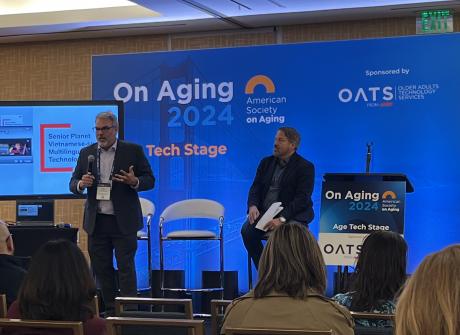“Military service introduces unique challenges to the work of caregiving. These caregivers are asked to manage the workload of caregiving while dealing with relocations, deployments and family separations, financial insecurity and additional barriers to employment, and their own health and mental health concerns,” from the “Caregiving in Military Families: 2020 Military Family Lifestyle Survey Special Report,” written by Blue Star Families, in conjunction with the Rosalynn Carter Institute for Caregivers (RCI) and the Institute for Veterans and Military Families, at Syracuse University.
Our nation's veterans fought for our freedom, protected our citizens, and sacrificed their lives for the greater good. We owe these heroes a debt of gratitude and care. However, as these veterans age, the number of caregivers needed to care for them also increases.
Caregivers in military families face unique and complex challenges. Dr. Jennifer Olsen, chief executive officer of the Rosalynn Carter Institute for Caregivers (RCI) says, “Caregiving in military families goes far beyond caregivers of those injured due to their military service, including aging parents and grandparents, other family members, friends and children with special needs.”
Millions of older Americans also are veterans. As our population continues to age, more people, including veterans, will need care. Caregivers provide the backbone of long-term care for this cohort. And being a caregiver is demanding. RCI’s programs provide support for military and veteran caregivers to foster connections and create a community of support, so caregivers don't feel like they are in it alone.
Older adults (72% of RCI’s program participants are ages 50 or older) provide a substantial portion of care for aging U.S. veterans. These caregivers often put their lives on hold to provide around-the-clock care for loved ones. Caregivers help to ensure that veterans receive the best possible care and can live as independently as possible. For these reasons, caregivers are essential members of the team that provides long-term care for veterans.
‘Caregivers providing care for recipients with behavioral symptoms may be at greater risk for mental health concerns themselves.’
“Difficulty finding employment that allows a caregiver to balance employment and caregiving responsibilities within the military lifestyle, which essentially prioritizes military service obligations over family and caregiving needs, can limit the available income in caregiver families. Addressing military spouse under- and unemployment and ensuring opportunities for flexible work may alleviate some of caregivers’ financial stresses. … As respite and support services are often unavailable or unreliable, caregivers in military families who are employed may need time off from their paid employment to fulfill their caregiving role, potentially impacting overall household earnings and therefore leaving caregiving families financially disadvantaged,” from “Caregiving in Military Families.”
Financial Burden
Many caregivers face a financial burden in caring for a veteran. Some require specialized care that can be costly, and others lack the financial resources to cover all the costs associated with caregiving.
Providing care to a sick or injured veteran often falls on the shoulders of the closest relatives. Many caregivers must take time off work to provide the necessary care. As a result, caregivers may suffer a decrease in income, loss of a career, and depletion of their savings. Some caregivers either delay retirement or simply don't retire.
“Caregivers in military families most commonly report the reasons their care recipient needs care are emotional or mental health problems (42%), long term physical conditions (27%), and developmental delay (21%) … Caregivers providing care for recipients with behavioral symptoms may be at greater risk for mental health concerns themselves, or for caregiver burnout,” from “Caregiving in Military Families.”
Emotional Stress
Though caregiving holds intrinsic rewards, many of RCI’s caregivers feel overwhelmed by caregiving demands and often feel guilty or anxious about their ability to provide proper care, leaving them lacking the time and energy to complete other household tasks.
Whether it is a chronic illness or the natural effects of aging, seeing a veteran, or even a loved one, decline in health can be emotionally challenging and hard to accept. Caregivers may struggle with feelings of guilt, wondering if they are doing enough to prevent decline.
Lack of Support
Unfortunately, while veteran caregivers take care of our nation’s heroes, often they are too busy taking care of others to find support for themselves. Lack of self care leads to burnout and eventually may cause caregivers to lose their passion for helping. Many caregivers lack the family or social support they need to care for themselves effectively.
RCI understands the challenges of caregiving and offers programs to promote a caregiver's overall health. RCI programs strive to fit each caregiver’s unique needs, whether they prefer an individual coach or to learn in a group setting.
RCI Military Programs
Two of RCI’s flagship programs are designed exclusively for military caregivers. Operation Family Caregiver (OFC) and Operation Caregiver Support (OCS) are free, virtual programs that provide support and resources to our family caregivers.
Operation Family Caregiver (OFC) provides eight sessions of tailored one-on-one coaching to caregivers of service members and veterans from all service eras. OFC sessions are delivered virtually by specially trained coaches, to meet a caregiver wherever they are. Coaches work with the caregiver to build skills related to problem-solving, self-care, stress management and safety.
Operation Caregiver Support (OCS) is a virtual support group for post-9/11 military and veteran caregivers. In addition to general groups, RCI offers specialty groups for Spanish speakers and parents who are caregivers to wounded warriors. OCS is offered bi-monthly, and caregivers can choose which group or groups to attend. Groups foster connections with one another, create a community of support, and build strategies for managing stress, creating a care team and more.
Learn more about RCI’s military and Veteran caregiver support programs, click here or contact rci.programs@rosalynncarter.org to enroll. RCI understands that caring for a veteran can be challenging and rewarding. RCI supports caregivers every step of the way.
Deidre (Dee) Blasyck, a veteran of the Navy Reserves, has been a military caregiver since 2008—first for a close friend and Navy veteran who suffered a traumatic brain injury (TBI), and then in 2016 when her husband left the Army, as he struggled with health concerns including physical injuries, post-traumatic stress disorder (PTSD), and a TBI. In 2019, Blasyck began working as a caregiver coach with Operation Family Caregiver, RCI's signature military program, for which she now serves as recruitment manager.









